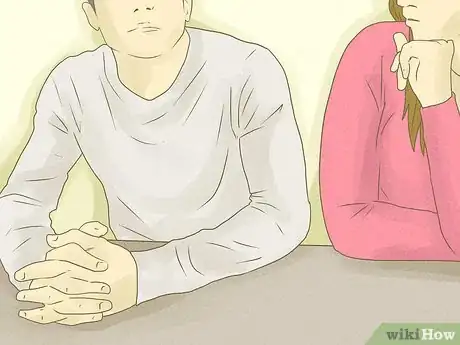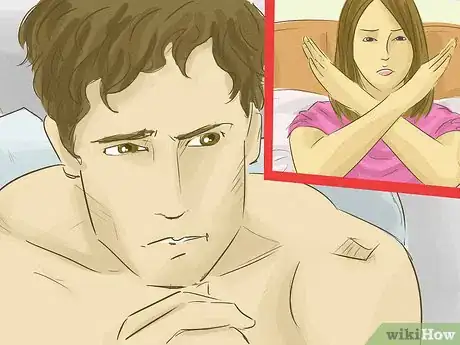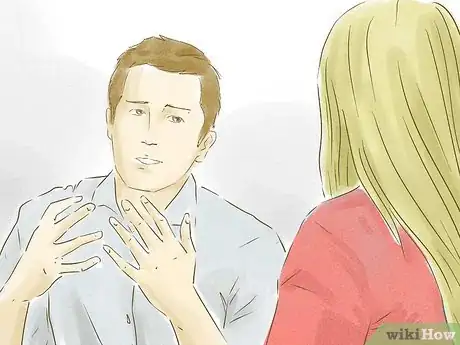This article was co-authored by Klare Heston, LCSW. Klare Heston is a Licensed Independent Clinical Social Worker based in Cleveland, Ohio. With experience in academic counseling and clinical supervision, Klare received her Master of Social Work from the Virginia Commonwealth University in 1983. She also holds a 2-Year Post-Graduate Certificate from the Gestalt Institute of Cleveland, as well as certification in Family Therapy, Supervision, Mediation, and Trauma Recovery and Treatment (EMDR).
There are 10 references cited in this article, which can be found at the bottom of the page.
This article has been viewed 29,150 times.
When a person first falls in love with someone, it’s difficult to think that they won’t have these same feelings down the road. Unfortunately, however, feelings and situations can change and people can easily fall out of love. If you question whether or not you are still in love with your partner, you may be able to determine if you have fallen out of it by examining changes in your relationship. By reviewing the level of attraction and physicality, the communication patterns, and the negative relationship patterns, you should have a better idea of whether your relationship just needs some extra work, or if you are indeed falling out of love with your partner.
Steps
Examining Your Level of Attraction and Physicality
-
1Consider changes in your lives. Relationships will change, as will the circumstances of each individual partner. Adapting to changes does not necessarily mean that you are falling out of love. Take some time to consider what is going on in your life, as well as your partner's life, and how those changes may be impacting your dynamic.
- Many relationships go through a "honeymoon period.” When this period ends, the relationship may start to feel different. This does not necessarily mean you are falling out of love, though.[1]
- Major life changes may impact the amount of stress in your relationship. These changes can make your relationship feel different, but that doesn’t mean it’s doomed to stay that way.
- If you are having a difficult time telling whether your relationship is being impacted by external forces or internal feelings, consider seeing a couple's therapist with your partner.[2]
-
2Think about how often you touch your partner. When couples are in love, they often show physical affection toward one another. Whether they are holding hands, cuddling, or just sitting so close they meet, they often want to engage in physical contact. When the love starts to diminish, however, you may find that you don’t have the same urge to show physical affection.
- You may find that you recoil when your partner attempts to touch you. Their once welcome caresses are now no longer wanted by you. This is often a strong indicator.[3]
- Keep in mind that changes in physical contact don't necessarily mean you have fallen out of love.
- It is important to consider whether physical contact is changing because the relationship is changing, or because you and your partner genuinely do not like showing affection to one another anymore.
Advertisement -
3Look at your intimacy frequency. If you’re falling out of love with your partner, you may find that you aren’t as intimate as you used to be. You may not want to engage because you feel guilty, or because you just don’t feel close to them anymore. You may also feel so disrespected and hurt by your partner— which could be why you have fallen out of love—that you don’t want to share that aspect of yourself with them.
- You may also find that the quality of your intimacy has decreased. You may not enjoy the act as much anymore, or you may not feel emotionally connected.[4]
- Don't confuse different levels of intimacy with the absence of desire. It’s natural for intimacy to wax and wane throughout the course of a relationship.
- However, if you feel physically repulsed by your partner and have little or no desire to connect with them physically, this could be a warning sign of a deeper issue.
-
4Determine if you are attracted to others more often than you used to be. It’s normal and natural to find others besides your partner attractive. If you notice that you seem to be on the prowl and notice others more than normal, you could be falling out of love. When people are committed to each other, they tend to stop themselves from looking elsewhere. When the love dies down, however, they are more open to noticing others around them.
- You may also find that you don’t mind if you see your partner checking out others.[5]
-
5Think about if you’d rather spend time with anyone but your partner. Couples in love typically like to spend as much time as possible with each other. However, you may be at the point where being near your partner is anything but enjoyable. You may find yourself cancelling dates and finding alternate plans instead to avoid being with your partner.[6]
Evaluating Communication Patterns
-
1Listen to how you talk to your partner. People in love more often than not speak kindly and respectfully to each other. However, those who find themselves falling out of love may notice things they don’t like about their partner. As a result, they may be more inclined to point them out verbally.
- For instance, you may hear yourself nitpicking at your partner constantly, or frequently criticizing what they do. You may also find yourself talking negatively about them to your friends and family.
-
2Ask yourself if you withhold. Your partner may have been the first person you wanted to share new information with. Now, you may want to talk to everyone but them. The idea of sharing your thoughts, feelings, emotions, and news with your partner may seem exhausting, or you just don’t feel like they deserve to hear from you.
- You may not be interested in what they have to say, or may feel like they don’t deserve to have your ear.[7]
-
3Check whether your communication is forced. When you do talk to your partner, do you only engage because you feel like you have to? Do you find that it is difficult to find things to talk about, or you have to work up the energy to talk to them? If so, you may be falling out of love.
- The communication signs may be subtle at first. For example, the quality and subject matter of the conversations may begin to get more superficial.
- Over time, you may feel like you’re talking less and less frequently. Eventually, it may feel like you don’t talk at all.[8]
-
4Question if you keep secrets. Honesty is one of the markers of love. If you begin to keep things from your partner, even if they are simply activities you would have shared before, you could feel disconnected. Not feeling comfortable or willing enough to share information could be a sign of falling out of love.[9]
-
5Check your communication with those around you. If your communication is virtually nonexistent with your partner, yet you find yourself gabbing for hours with a coworker or other acquaintance, this could be a tell-tale sign of a wandering eye. Perhaps you are no longer as interested in talking to your partner because you are attracted to or in love with someone else.
- If you find yourself spilling intimate details with someone other than your partner, you may have fallen out of love.
- Your tendency to intimately communicate with other people could demonstrate that you’re trying to fill a void in your relationship.
Looking at Negative Relationship Patterns
-
1Look at if you avoid talking about the future. When you are in love with someone, you can’t help but become excited when thinking about the future. Typically, you would want it to involve them. If you look towards the future but don’t see your partner in it, there’s a chance you aren’t in love anymore.
- You may also find yourself changing the subject when your partner talks about your future together.
- You may start backing out of plans you have always talked about, such as having children or buying a home together.[10]
-
2Examine if you feel jealous or uncomfortable around other couples. When you spend time with loving couples, are you jealous of the partnership they have? Would you rather spend time anywhere else but in their company? If being around two people who love each other makes you uneasy, it may be because you aren’t in love with your partner anymore.[11]
-
3Determine if you care about resolving conflicts. In the initial stages of your partnership, you may have found yourself working hard to resolve any problems or issues that arose in your relationship. Now, however, you may just not care anymore. Not working towards making the problems right is a sign that you aren’t committed to or engaged in your relationship anymore.
- Similarly, you may find yourself just ignoring problems that you would have tried to solve before.
- You may not feel the relationship is worth the effort, or you may simply no longer care.[12]
-
4Figure out how you feel about saying “I love you.” Do you feel like you are telling a lie when you say “I love you” to your partner? Do you feel like you have to force yourself to say those three little, but powerful, words? If so, there’s a good chance you simply aren’t in love anymore.
- The same thing goes for when your partner says they love you. Hearing the words may make you feel uncomfortable or even guilty.[13]
References
- ↑ http://www.primermagazine.com/2013/love/surviving-the-end-of-the-honeymoon-period
- ↑ https://psychcentral.com/blog/archives/2014/08/15/top-10-underpublicized-reasons-to-seek-couples-counseling/
- ↑ http://www.huffingtonpost.com/randi-gunther/falling-out-of-love_b_6942680.html
- ↑ http://blogs.psychcentral.com/relationship-corner/2016/08/12-signs-you-are-falling-out-of-love-with-your-partner/
- ↑ http://www.huffingtonpost.com/shannon-colleary/when-your-spouse-is-no_b_3128497.html
- ↑ http://blogs.psychcentral.com/relationship-corner/2016/08/12-signs-you-are-falling-out-of-love-with-your-partner/
- ↑ https://www.powerofpositivity.com/5-signs-partner-falling-love/
- ↑ http://blogs.psychcentral.com/relationship-corner/2016/08/12-signs-you-are-falling-out-of-love-with-your-partner/
- ↑ https://www.bolde.com/is-your-relationship-over-17-signs-the-love-is-gone/
- ↑ http://www.today.com/popculture/signs-your-relationship-going-nowhere-fast-sorry-1D80252010
- ↑ https://www.bolde.com/is-your-relationship-over-17-signs-the-love-is-gone/
- ↑ http://www.marriage.com/advice/love/signs-you-may-be-falling-out-of-love-in-marriage/
- ↑ https://shrink4men.wordpress.com/2009/01/20/12-signs-you-should-break-up-with-girlfriend-boyfriend-spouse/









































































